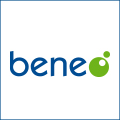Health ingredient specialist BENEO has opened a new rice starch production line in a special inauguration event.
Attendees included Nadia Lapage (Secretary General FEVIA 1 Flanders), Carl Devlies (Alderman of City of Leuven), Dominic Speleers (Member of Executive Board of BENEO), Christoph Boettger (Member of Executive Board of BENEO) and Roland Vanhoegaerden (Operations Managing Director for BENEO’s Rice Ingredients). The addition of the new line increases production capacity at BENEO’s Wijgmaal facility in Belgium by 50%, allowing the company to continue meeting growing demand for its clean label rice ingredients.
BENEO is a global provider of rice flour, starch and protein for the food and feed industry and the company’s unique rice derivatives are used in the production of a wide range of clean label products. The increasing demand for natural and clean label ingredients, in a wide range of applications, has led to BENEO’s production line expansion.
Roland Vanhoegaerden, Operations Managing Director for BENEO’s rice ingredients said: “From bakery and dairy to confectionery and baby food products, the demand is growing for our clean label ingredients. Here at BENEO we believe in investing for the long-term, and with the addition of this new rice starch production line, we have built even more resilience into our rice portfolio. As food manufacturers continue to move away from artificial additives and replace them with natural alternatives, we are well placed to meet their needs with our rice starch ingredients.”
The impact is on cost saving, but also on the environment, due to lower carbon emissions and a reduction in traffic. Our factory is in the middle of an urban area and by increasing barge use, we can reduce congestion and noise levels in the neighbourhood
The plant in Wijgmaal has a proud 160-year history in the area and BENEO has been significantly investing in the facility in recent years, to make it a frontrunner in sustainability. With the new production line BENEO’s water consumption at the Wijgmaal site stays the same while the production capacity increases by 50% at the same time. This is possible thanks to a two-step process of cleansing: first contaminants are separated from the used water by an evaporator. The condensate is in turn purified in a second step, resulting in water of drinking quality.
The plant receives two-thirds of rice raw material by barge and just one- third by truck due to another investment taken a few years ago.
Vanhoegaerden continued: “The impact is on cost saving, but also on the environment, due to lower carbon emissions and a reduction in traffic. Our factory is in the middle of an urban area and by increasing barge use, we can reduce congestion and noise levels in the neighbourhood. All in all, the addition of the new line increases our production capacity, enabling us to continue meeting growing demand for our clean label rice ingredients, whilst minimising our impact on the environment and neighbourhood.”

